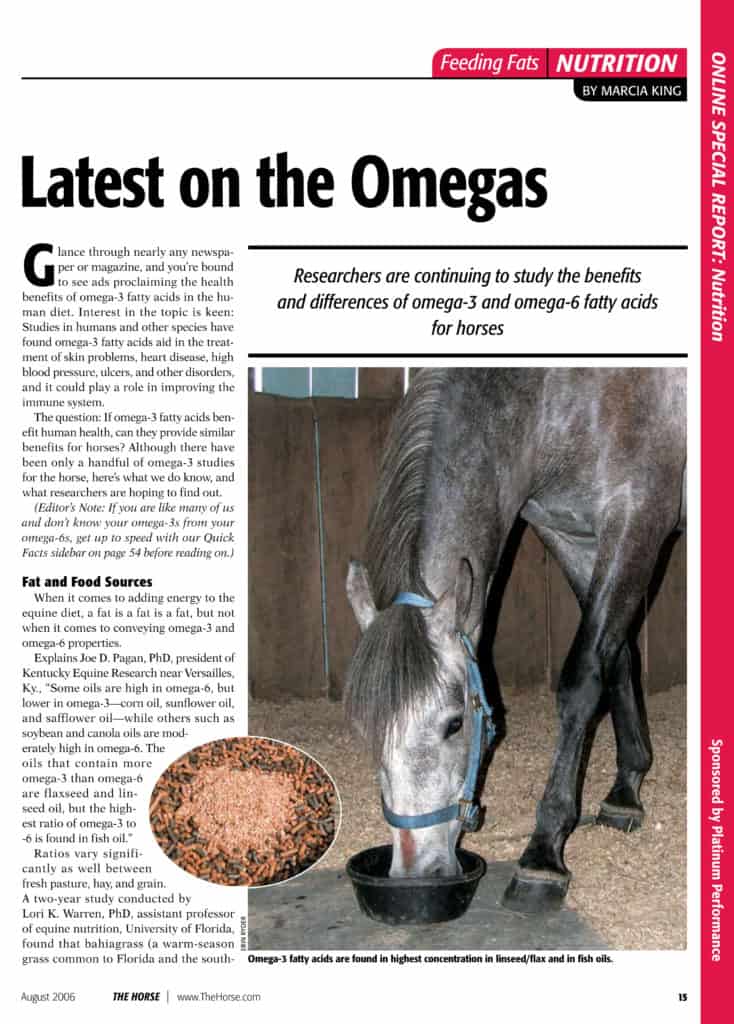
Omega Basics: Easy as 1, 2, 3
Fats increase energy density of diets and are necessary to metabolize fat-soluble vitamins.

Fats increase energy density of diets and are necessary to metabolize fat-soluble vitamins.
Veterinarians often recommend psyllium for use as a laxative, specifically for clearing sand out of horses’ intestines to minimize the chances of sand colic. But new research indicates there might be another use for the phytogenic (plant-based)
Body condition scoring (BCS), an impartial way to evaluate a horse’s weight and welfare, is a valuable tool that helps horse owners understand their horses’ well-being. It is an important aid that can be used to make sound decisions regarding general
Research indicates that supplementing essential fatty acids in horses’ diets is useful and might be required.

When it comes to designing diets, knowing the basics of how horses digest food is half the battle. It’s important to consider each horse’s energy requirements before developing a feeding schedule.
Triheptanoin does not appear to be a good fat supplement for polysaccharide storage myopathy (PSSM) horses.
At the Purina Equine Veterinary Conference, held Oct. 17-19 in St. Louis, Mo., Karen Davison, PhD, manager of Equine Technical Services for the Horse Business Group of Purina Mills discussed managing inflammation and oxidative stress in horses
Knowing the nutrient composition of hay is vital to assuring horse’s needs are being met.
The key to a good feed program is to start with the proper type of forage for the individual, then (if needed) pick the right concentrate or supplement.
Illinois researchers studying the effect of nutritional supplementation with essential fatty acids (EFAs) reported that EFAs are absorbed systemically after oral administration and alter the normal pool of fatty acids in the bloodstream of horses.
“A horse that’s working hard does have a high energy requirement,” says Nielsen. “And when we are trying to get that into a horse, we have to feed him a fair bit of concentrate, meaning grain, of course. In this case, we run the risk of health

The question: If omega-3 fatty acids benefit human health, can they provide similar benefits for horses? Although there have been only a handful of omega-3 studies for the horse, here’s what we do know, and what researchers are hoping to find out.
Glance through nearly any newspaper or magazine, and you’re bound to see ads proclaiming the health benefits of omega-3 fatty acids in the human diet. Interest in the topic is keen: Studies in humans and other species have found omega-3 fatty acids
Hot, dry Tucson, Ariz., doesn’t conjure up images of equine nutrition research, but leading animal scientists convened there May 31-June 4 to present their latest findings on a variety of equine science topics. The following article highlights
Drought causes pastures to dry up, weeds to flourish, and horses to get thin without supplemental feeding. But there are other things going on in your fields that you need to know about in order to protect your horses from problems such as
Oregon implemented a provisional equine feed label law on June 1 that would allow feed manufacturers to add non-structural carbohydrates (NSC) to the list of nutrient requirements already found on feed bags in that state. Adding NSC to the feed
Stay on top of the most recent Horse Health news with
"*" indicates required fields